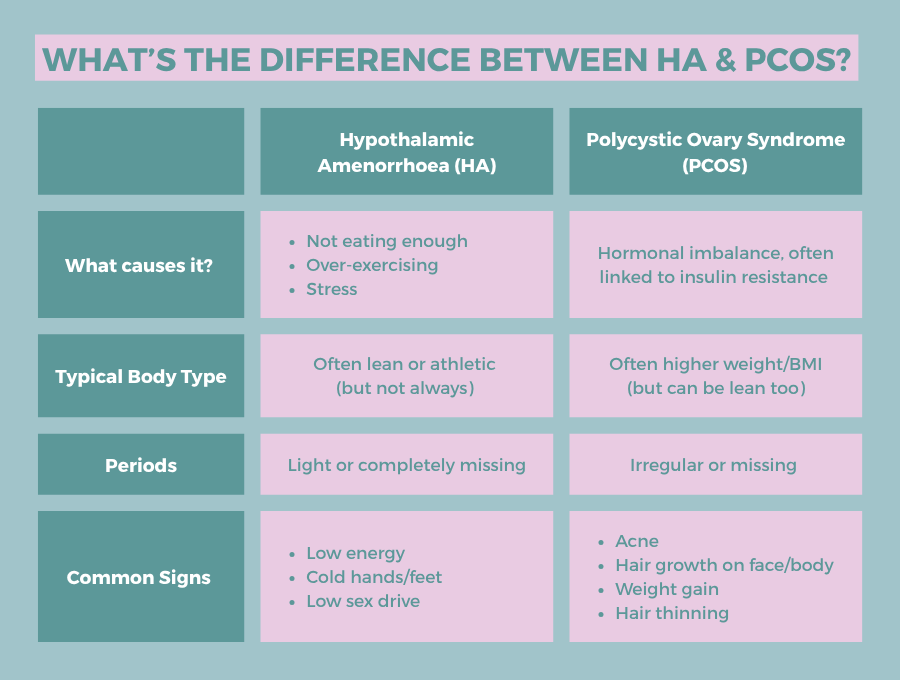No period? Here are the 2 most common causes!
Missing periods? Irregular cycles? You’re not alone, but getting the right diagnosis is key. Two common causes of menstrual issues are Polycystic Ovary Syndrome (PCOS) and Hypothalamic Amenorrhoea (HA). While they can look similar on the surface, they’re actually very different and need very different treatment approaches.
Let’s break it down simply.
Hypothalamic Amenorrhoea (HA):
This happens when your body doesn’t feel safe enough to have a period, often due to under-eating, intense workouts, or chronic stress. Your brain slows down reproductive hormone production to conserve energy.
Polycystic Ovary Syndrome (PCOS):
PCOS is a hormonal condition that can cause high androgens (male hormones), insulin resistance, and irregular ovulation. It often leads to signs like acne, excess body hair, or weight gain, but symptoms can vary a lot from person to person.
Hormone Clues
Analysing blood tests are key to help figure out what’s going on:
HA: Low estrogen, low LH:FSH ratio, high SHBG, normal androgens
PCOS: High LH:FSH ratio, high androgens, low SHBG, often insulin resistance
Treatment Approaches
Treating HA
The primary goal is to restore energy balance:
Increase total energy intake, focusing on carbohydrates and healthy fats
Establish 3 regular meals + 3 snacks daily
Reduce exercise intensity and volume
Prioritise rest, stress management, and mental health support
Monitor bone health, especially if periods have been absent for a long time
Support from a dietitian, psychologist, and GP is often essential for recovery.
Treating PCOS
Management focuses on balancing hormones and improving insulin sensitivity:
Choose low-GI, whole food carbohydrates
Focus on protein, fibre, and healthy fats
Incorporate regular resistance training
Address gut health, sleep, and stress
Consider evidence-based supplements such as myo-inositol, omega-3s, and vitamin D
A personalised approach is key – what works for one person with PCOS may not work for another.
The Bottom Line
Missing or irregular periods are your body’s signal that something needs attention. Understanding whether it is PCOS or HA can make all the difference. Treating HA like PCOS may delay recovery, and treating PCOS like HA may not address the hormonal imbalance.
The good news is that both conditions can be managed and supported with the right nutrition and lifestyle changes.
Here at Balance Nutrition, we work with women to uncover the root cause of hormone disruptions and create personalised, evidence-based plans to restore health and wellbeing. For individualised support specific to your needs, we recommend chatting with our dietitian Madison who specializes in managing HA and PCOS with a deep expertise in women’s health and nutrition. To book an appointment, visit the link below or call us on 07 4566 0765.

